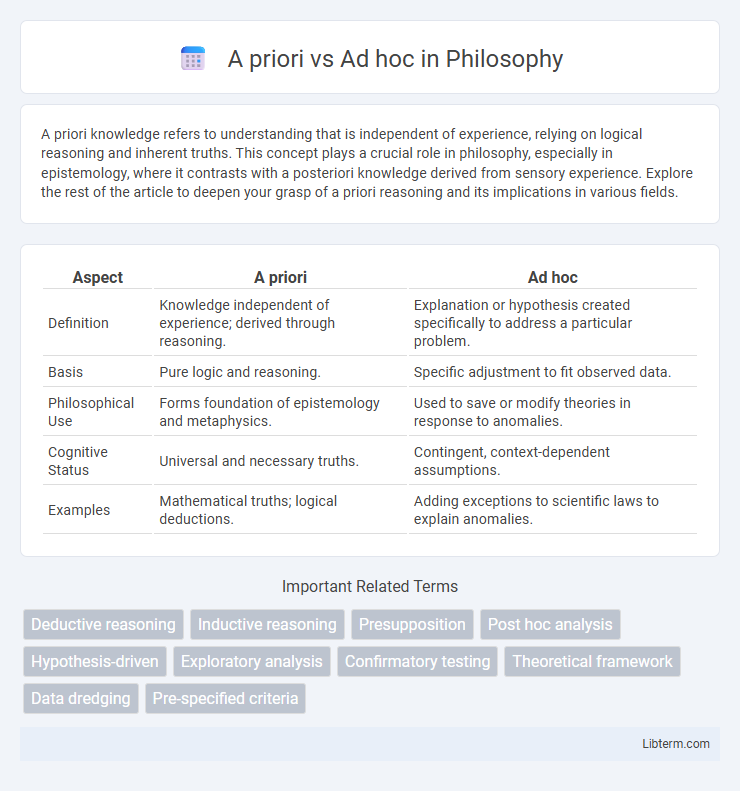A priori knowledge refers to understanding that is independent of experience, relying on logical reasoning and inherent truths. This concept plays a crucial role in philosophy, especially in epistemology, where it contrasts with a posteriori knowledge derived from sensory experience. Explore the rest of the article to deepen your grasp of a priori reasoning and its implications in various fields.
Table of Comparison
| Aspect | A priori | Ad hoc |
|---|---|---|
| Definition | Knowledge independent of experience; derived through reasoning. | Explanation or hypothesis created specifically to address a particular problem. |
| Basis | Pure logic and reasoning. | Specific adjustment to fit observed data. |
| Philosophical Use | Forms foundation of epistemology and metaphysics. | Used to save or modify theories in response to anomalies. |
| Cognitive Status | Universal and necessary truths. | Contingent, context-dependent assumptions. |
| Examples | Mathematical truths; logical deductions. | Adding exceptions to scientific laws to explain anomalies. |
Introduction to A Priori and Ad Hoc
A priori knowledge refers to information or principles derived through logical reasoning independent of empirical evidence, often foundational in disciplines like mathematics and philosophy. Ad hoc explanations are created to address specific problems or anomalies post hoc, without underlying general principles or prior theoretical frameworks. Understanding the distinction aids in evaluating the rigor and applicability of arguments within scientific and analytical contexts.
Defining A Priori Reasoning
A priori reasoning involves deriving conclusions based on theoretical deduction and logical analysis without relying on empirical evidence, making it foundational in fields like mathematics and philosophy. It contrasts with ad hoc reasoning, which is tailored to specific cases or observations without a general basis. Understanding a priori reasoning is essential for developing principles that apply universally, independent of experimental data.
Understanding Ad Hoc Approaches
Ad hoc approaches prioritize immediate, situational problem-solving without reliance on pre-established frameworks or theories, allowing for flexibility and rapid adaptation in dynamic environments. These methods thrive in contexts requiring tailored solutions, often leveraging specific data or conditions unique to the problem at hand. Understanding ad hoc approaches involves recognizing their contrast with a priori methods, which depend on predefined assumptions and systematic planning prior to data observation.
Key Differences Between A Priori and Ad Hoc
A priori knowledge is based on theoretical deduction and logical reasoning independent of empirical evidence, while ad hoc refers to solutions or hypotheses created specifically to address a particular problem or situation without broader application. A priori approaches rely on universal principles or assumptions, whereas ad hoc methods are often temporary and tailored responses lacking generalizability. The key difference lies in the foundational basis: a priori is grounded in abstract reasoning, whereas ad hoc depends on context-specific adjustments.
Examples of A Priori in Research
A priori knowledge in research refers to understanding derived independently of experience, such as mathematical theorems or logical deductions used to formulate hypotheses before data collection. For example, a researcher might predict a correlation between variables based on established theoretical frameworks like Newton's laws in physics or Kantian ethics in philosophy. This contrasts with ad hoc methods, where hypotheses arise post hoc from observed data patterns without prior theoretical grounding.
Ad Hoc in Practical Decision-Making
Ad hoc decision-making involves creating solutions tailored to specific problems without relying on predetermined theories or frameworks, allowing for rapid and flexible responses in dynamic environments. This approach prioritizes practicality and immediate relevance, making it highly effective in real-time business, emergency management, and technology troubleshooting where unique situations demand customized strategies. Unlike a priori methods based on general principles, ad hoc decisions optimize adaptability and specificity to achieve efficient outcomes in unpredictable contexts.
Advantages of A Priori Methods
A priori methods offer significant advantages by allowing predictions and decisions based on theoretical foundations or established principles without requiring empirical data. These methods enhance efficiency and reduce costs since data collection and experimentation are minimized or unnecessary. Their reliance on logical reasoning and universally accepted axioms ensures consistent and replicable outcomes across various domains.
Limitations of Ad Hoc Solutions
Ad hoc solutions often suffer from scalability issues, as they are designed to address specific problems without considering broader system implications or future expansions. Their lack of standardization can lead to inconsistent results and complicate maintenance due to the absence of formal structure or documentation. Furthermore, ad hoc approaches may fail to provide robust, generalizable frameworks, limiting their effectiveness across diverse scenarios or complex problem spaces.
When to Use A Priori vs Ad Hoc
Use a priori analysis when hypotheses or criteria are defined before data collection, allowing for structured and hypothesis-driven research. Choose ad hoc analysis for exploratory situations where patterns or insights emerge during or after data collection, requiring flexible and adaptive methods. Prioritizing a priori methods enhances statistical validity, while ad hoc approaches are crucial for discovering unexpected trends.
Conclusion: Choosing the Right Approach
Selecting the right approach between a priori and ad hoc methods depends on the specific context and objectives of the analysis. A priori approaches provide structured, theory-driven frameworks ideal for systematic evaluation, while ad hoc methods offer flexibility tailored to unique or evolving situations. Prioritizing clarity of purpose and the nature of available data ensures the chosen method aligns with desired outcomes and enhances decision-making effectiveness.
A priori Infographic

 libterm.com
libterm.com